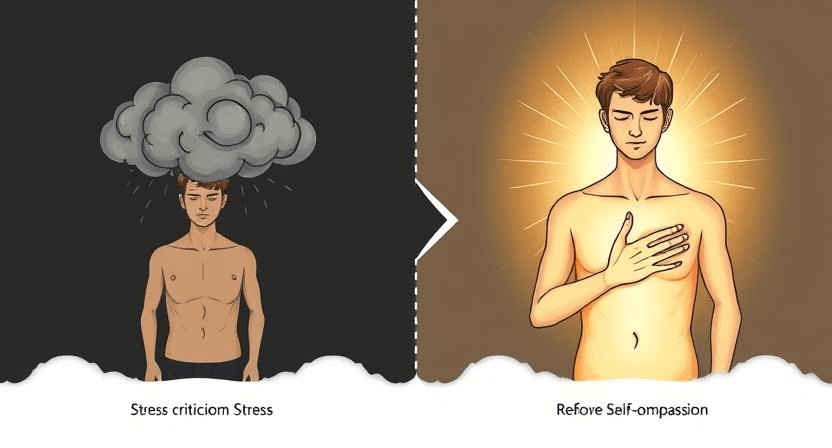We often think of stress as something external—work deadlines, relationship conflicts, or financial struggles. However, one of the biggest sources of stress comes from within: our own self-criticism. The way we talk to ourselves can trigger the same stress responses as external threats, leading to chronically elevated cortisol levels. But here’s the good news—self-compassion can literally rewire our stress response, offering a biological antidote to the damage done by self-judgment.
The Science of the Stress-Criticism Cycle
Self-criticism activates the sympathetic nervous system, releasing cortisol and other stress hormones. Over time, this creates a biochemical stress loop that keeps the body in a constant state of fight-or-flight. This prolonged activation disrupts digestion, sleep, immune function, and even brain health. If you’ve ever noticed that a harsh inner dialogue leaves you feeling drained, anxious, or physically tense, you’re not imagining it—your body is responding as if there’s a real threat.
The signs of chronic self-criticism can show up in different ways. You might experience digestive discomfort during times of intense self-judgment, struggle to fall asleep despite exhaustion, or find yourself relying on caffeine or sugar just to get through the day. Muscle tension that never seems to go away and increased sensitivity to pain are also common indicators that your body is carrying the weight of an overactive inner critic.
How Self-Compassion Reverses Stress Damage
When we replace self-judgment with kindness, we activate the parasympathetic nervous system, reducing cortisol levels. Studies show that practices like self-compassion meditation and gentle self-touch, like placing a hand on your heart, can lower stress markers within minutes. The shift doesn’t happen overnight, but every small act of self-kindness creates physiological changes that help the body return to a state of balance.
A simple way to start is by speaking to yourself the way you would a close friend. Next time your inner critic pipes up, pause and take a few deep breaths before responding. Try using compassionate affirmations like, “This is a moment of suffering. I choose kindness.” These small but intentional changes can make a big difference in how your body processes stress.
Conclusion
Your inner dialogue isn’t just emotional—it’s biochemical. Shifting from self-judgment to self-compassion isn’t just a mindset shift; it’s a physiological intervention that reduces stress and promotes healing. The next time your inner critic speaks up, remember: your body is listening, and it deserves kindness.
Let’s connect other ways too! Follow me here on Instargram @doctorrileysmith and at youtube @doctorrileysmith
You May Like To Read More:
Decoding Your Body’s Signals: The Integration of Metabolic Health and Mental Wellbeing
The Missing Link in Nervous System Regulation: Your Metabolic Foundation
Nourishing Heart and Body: The Ancient Wisdom of Winter Eating

